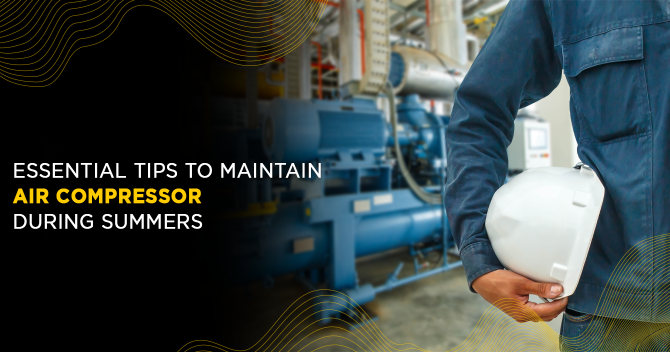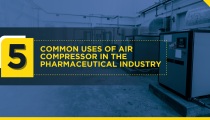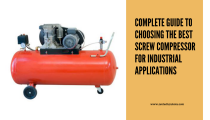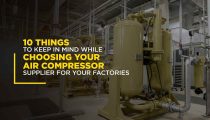A steady supply of oil-free and contamination-free compressed air is…

Essential Tips To Maintain Air Compressor During Summers
Compressed air is a useful ingredient in many industries, useful in precise stamping, mixing, clamping, and cleaning functions. While you might have a strong maintenance program for all of your equipment, supporting the health of air compressors can get a little tricky, especially with the onset of the summers.
Compressed air systems can seriously bow down under pressure from overuse, rising humidity, and molecular expansion of objects due to flaring temperatures, and these effects multiply in the summers when the temperatures are already running high. Some common signs indicating that your compressor might be going out of whack – unusual noise, oozing liquid, unexpectedly high electricity bills, hot air discharge, and an overheated machine.
Competent air compressor suppliers are available to replace parts any time you need them to. However, we recommend taking the following measures ensuring the good health of the compressors and likewise, to improve overall machine performance:
Clear Intercoolers and Aftercoolers
Wipe off accumulated dust and debris from the coolers from time to time to keep them functioning to their optimum strength. The heat and humidity of summer months can lead to an excess of accumulated semi-moist debris on the compressor blades.
You will have an easy go at degreasing by –
- Spraying a liquid degreaser
- Using an acetone or kerosene solution for rinsing
- Spraying methylated spirits to wash the blades clean of oil
Refill with Clean Oil
Excessively hot oils lead to highly damaging varnishes as it swishes through metal pipes. Accumulated over time, this can lead to pipeway blockages. Maintain cooler temperatures for the lubricant – preferably below 180° F, to prevent unexpected malfunctions. Keep the oil coolers clean, regularly monitored, and secure from water in conditions where the oil precipitates in extremely low or extremely high temperatures.
Also remember to use the right kind of lubricant. A primary reason for compressor failures is the usage of ‘Universal Oil’ which is thin in consistency and tends to lose its oleaginousness when subjected to fluctuating temperatures. Instead, opt for mineral and synthetic oils for your compressed air system and refill after checking these lubricants for suitable viscosity and cleanness.
Keep Reading: How To Select The Right Oil For Your Air Compressor
Wipe or Replace Old Filters
An old filter can downgrade the performance of your compressor by circulating in sooty air from the outside. In addition, dust-laden compressors can affect system performance and demand more energy – even in performing very basic functions. Replace old and rusty filters from a competitive air compressor supplier in order to avoid excess power bills, expensive maintenance, and undermining downtimes.
As a rule of thumb, it is important to inspect and replace / refurbish your old air compressor filters every summer or once every two years.
Monitor Drain Traps for Collected Dirt
Drain traps for oil and water discharge in air compressors sometimes have a need for manual draining of the air lines. Failing this, compressor ducts would be running the risk of accidental floods. This is why condensate residue inside duct lines should be thoroughly wiped off and systematically ejected.
There are several ways to decontaminate drain traps. You can de-clog flow channels manually by hand if the blockage is near to the surface. Debris jamming water flow can also be eliminated with a long drain brush or a drain cleaning wire that plumbing professionals also refer to as a ‘sink snake’.
Alternatively, you can use a vacuum to suction out stubborn waste from the middle or towards the end of the duct. The next-level cleaning technique is to use a drain gun that would exert compressed gas into the line to push out slime, dirt, and hard debris out of the flow channel.
Replace Rusty Parts
A single corroding part can turn your machine’s entire functionality upside down. Before the harsh summers begin in full swing, take stock of all the worn parts of your system and suitably refurbish, oil, or replace.
Some of the most commonly replaced compressor parts are – capacitor, contactor, air filters, fan motor or blower motors, and evaporator coils. Neglected, even the tiniest rusting pinhole of an air filter can lead to unchecked release of refrigerants in the air. Another point to note – not all handymen can spot such minute corrosion. You need to bring specialised air compressor technicians on board to detect and remedy such glitches.
Airy Compressor Room
Air compressors are massive heat generating machines which give off fumes and hot air that may saturate the room if not properly ventilated. We recommend Grille and air steam damper units to shut out foreign bodies from passing through air ducts and also drive out cold draughts in the process.
Air compressor service providers advantageously place eliminatory air ducts towards the lower side of one of the compressor walls. On the opposite wall, thermostatically-controlled ventilation fans could be placed right to the top to doubly ensure speedy circulation and changing of air.
Remember, an ounce of maintenance is worth a pound of repair costs! Ace your compressor maintenance game before summer swings in.





[url=https://www.one-xbet-france.com]one-xbet-france.com[/url]
Plateforme en ligne 1xBet: outils spout gagner de l’argent. En blanket, 1xBet France est un bookmaker classique peddle comme bet365 bookmaker et beaucoup d’autres.
http://one-xbet-france.com
Your point of view caught my eye and was very interesting. Thanks. I have a question for you.
I don’t think the title of your article matches the content lol. Just kidding, mainly because I had some doubts after reading the article.
Наша команда квалифицированных исполнителей предоставлена предоставлять вам инновационные подходы, которые не только предоставят долговечную безопасность от холодных воздействий, но и дарят вашему жилищу оригинальный вид.
Мы практикуем с новыми строительными материалами, ассигнуруя постоянный период эксплуатации и отличные результаты. Изоляция наружных стен – это не только экономия на огреве, но и заботливость о экологической обстановке. Экономичные технологии, каковые мы применяем, способствуют не только жилищу, но и сохранению природы.
Самое главное: [url=https://ppu-prof.ru/]Утепление фасада снаружи цена[/url] у нас начинается всего от 1250 рублей за квадратный метр! Это доступное решение, которое изменит ваш дом в фактический душевный угол с скромными расходами.
Наши примеры – это не только теплоизоляция, это формирование территории, в котором всякий элемент отразит ваш личный модель. Мы берем во внимание все ваши пожелания, чтобы преобразить ваш дом еще более гостеприимным и привлекательным.
Подробнее на [url=https://ppu-prof.ru/]http://ppu-prof.ru[/url]
Не откладывайте заботу о своем доме на потом! Обращайтесь к профессионалам, и мы сделаем ваш дворец не только тепличным, но и по последней моде. Заинтересовались? Подробнее о наших делах вы можете узнать на нашем сайте. Добро пожаловать в обитель удобства и высоких стандартов.
1. Вибір натяжних стель: як вибрати ідеальний варіант?
2. Модні тренди натяжних стель на поточний сезон
3. Які переваги мають натяжні стелі порівняно зі звичайними?
4. Як підібрати кольори для натяжної стелі у квартирі?
5. Секрети догляду за натяжними стелями: що потрібно знати?
6. Як зробити вибір між матовими та глянцевими натяжними стелями?
7. Натяжні стелі в інтер’єрі: як вони змінюють приміщення?
8. Натяжні стелі для ванної кімнати: плюси та мінуси
9. Як підняти стеля візуально за допомогою натяжної конструкції?
10. Як вибрати правильний дизайн натяжної стелі для кухні?
11. Інноваційні технології виробництва натяжних стель: що варто знати?
12. Чому натяжні стелі вибирають для офісних приміщень?
13. Натяжні стелі з фотопринтом: які переваги цієї технології?
14. Дизайнерські рішення для натяжних стель: ідеї для втілення
15. Хімічні реагенти в складі натяжних стель: безпека та якість
16. Як вибрати натяжну стелю для дитячої кімнати: поради батькам
17. Які можливості для дизайну приміщень відкривають натяжні стелі?
18. Як впливає вибір матеріалу на якість натяжної стелі?
19. Інструкція з монтажу натяжних стель власноруч: крок за кроком
20. Натяжні стелі як елемент екстер’єру будівлі: переваги та недоліки
стелі натяжні [url=https://www.natjazhnistelifvgtg.lviv.ua]https://www.natjazhnistelifvgtg.lviv.ua[/url] .
[url=https://ametformin.com/]metformin 134[/url]
[url=http://metoformin.online/]metformin glucophage[/url]
[url=https://ismetformin.online/]metformin generic[/url]
[url=http://medicinesaf.online/]canadien pharmacies[/url]
[url=https://azithromycinps.online/]can you purchase azithromycin over the counter[/url]
[url=https://bestmetformin.online/]metformin online[/url]
[url=https://motomagazinvfdvgd.vn.ua/uk/v-shiny/]motomagazinvfdvgd.vn.ua/uk/v-shiny/[/url]
В нашем мотомагазине вы посчитаете запасные части чтобы мотоциклов, скутеров, снегоходов и квадроциклов. ЯЗЫК нас ваша милость хронически почтете масла чтобы байков, фильтра, цепи.
motomagazinvfdvgd.vn.ua/uk/v-botinki/
[url=https://motomagazinvfdvgd.vn.ua/uk/v-motodzhinsy/pol-is-zhenskiy/]motomagazinvfdvgd.vn.ua/uk/v-motodzhinsy/pol-is-zhenskiy/[/url]
В ТЕЧЕНИЕ нашем мотомагазине ваша милость найдёте запасные части для байков, скутеров, снегоходов и еще квадроциклов. ЯЗЫК нас вы всегда найдёте масла чтобы мотоциклов, фильтра, цепи.
motomagazinvfdvgd.vn.ua/uk/v-shlema/vybor-po-stilyu-is-kross-enduro-kvadrotsikl-utv-baggi/
sandyterrace.com
적어도 이 사람은 아이디어가 너무 많아서 괴물이라고 부를 수 있습니다.
[url=https://oazithromycin.online/]how to get azithromycin in usa[/url]
[url=https://tadalafilu.online/]buy tadalafil 10mg[/url]
[url=https://metforemin.online/]1700 mg metformin[/url]
[url=https://happyfamilystorerx.online/]pharmacy canadian superstore[/url]
[url=http://bestmedsx.online/]canadian online pharmacy no prescription[/url]
[url=https://tadalafilgf.com/]cialis 200mg pills[/url]
[url=https://synthroidx.online/]order synthroid without prescription[/url]
[url=https://oazithromycin.com/]buy azithromycin tablet 500mg uk[/url]